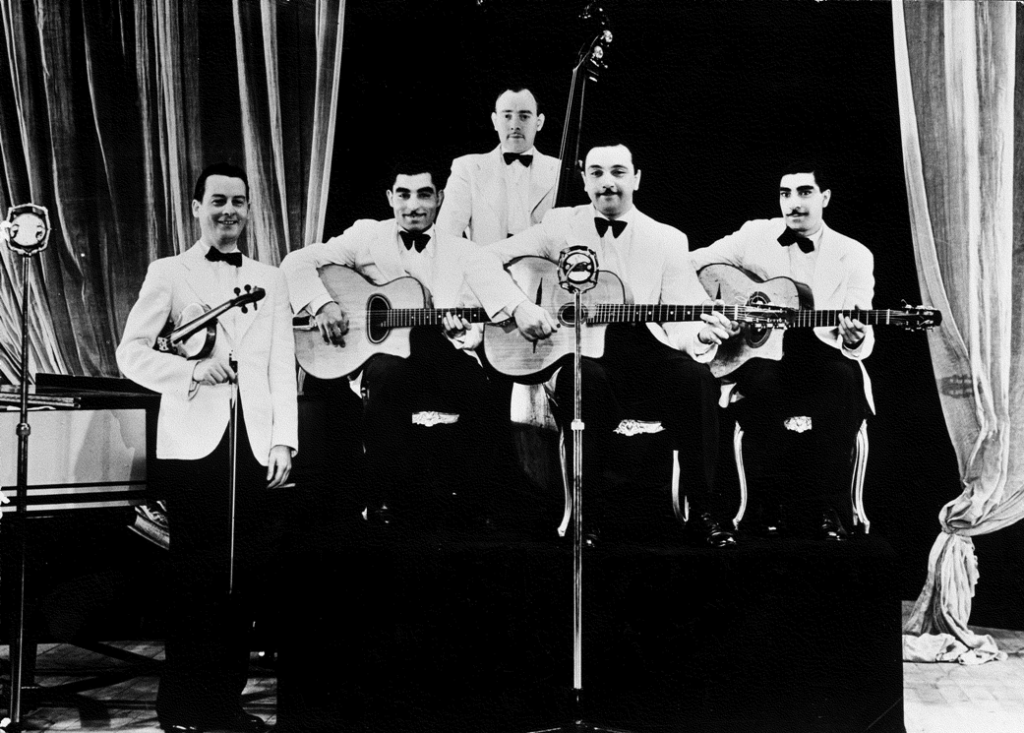The Quintette du Hot Club de France, formed by Django Reinhardt and Stéphane Grappelli, was one of the most influential and iconic jazz bands of the 1930s and 1940s. With their innovative style and virtuosic performances, they revolutionized the genre and left an indelible mark on jazz history.
The band’s origins can be traced back to 1934 when Django Reinhardt, a gifted guitarist, and Stéphane Grappelli, a talented violinist, joined forces. Inspired by American jazz, they sought to create a unique sound that combined the energy of swing with the intricate melodies and harmonies of gypsy music.
The original lineup of the Quintette du Hot Club de France included Django Reinhardt on guitar, Stéphane Grappelli on violin, Roger Chaput on rhythm guitar, Louis Vola on double bass, and Joseph Reinhardt, Django’s brother, on second rhythm guitar. The band’s instrumentation, featuring two guitars, violin, and double bass, was unconventional for a jazz ensemble but became the defining characteristic of their sound.
The Quintette du Hot Club de France quickly gained popularity in Paris and beyond, captivating audiences with their infectious rhythms, intricate improvisations, and exquisite interplay between the musicians. Django Reinhardt’s remarkable guitar playing, characterized by his rapid-fire technique and unparalleled improvisational skills, became the band’s centerpiece, while Grappelli’s expressive and virtuosic violin playing added a melodic and lyrical dimension to their sound.
The band’s repertoire consisted of a mix of original compositions and reinterpretations of jazz standards. They infused their music with elements of traditional gypsy music, creating a unique fusion that became known as “gypsy jazz” or “jazz manouche.” The Quintette du Hot Club de France’s performances were characterized by their tight ensemble playing, dynamic solos, and infectious swing feel.
Throughout their career, the Quintette du Hot Club de France performed at numerous concerts and festivals, leaving a lasting impact on the jazz world. They played in renowned venues such as the Hot Club de France in Paris, and their performances became legendary. They also toured extensively, spreading their innovative style throughout Europe.
Some notable concerts and festivals where the Quintette du Hot Club de France performed include the Jazz à Vienne festival, the Nice Jazz Festival, the Django Reinhardt Festival in Samois-sur-Seine, and the Savoy Ballroom in New York City. They also collaborated with esteemed musicians such as Duke Ellington and Coleman Hawkins.
The Quintette du Hot Club de France’s career spanned from the mid-1930s until the outbreak of World War II in 1939. The war disrupted their activities, and after the war, the band went through several lineup changes. Despite these changes, Django Reinhardt and Stéphane Grappelli continued to collaborate on various projects, maintaining their musical partnership in different formations.
The Quintette du Hot Club de France’s impact on jazz cannot be overstated. Their innovative approach, impeccable musicianship, and groundbreaking blend of styles continue to inspire musicians to this day. Their recordings, including iconic albums such as “Djangology” and “Swing 39,” remain treasured classics of the genre. The legacy of the Quintette du Hot Club de France endures, serving as a testament to the extraordinary talent and creative vision of Django Reinhardt and Stéphane Grappelli
